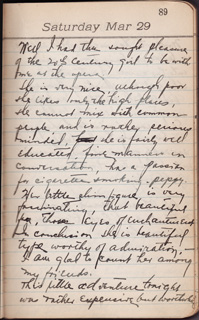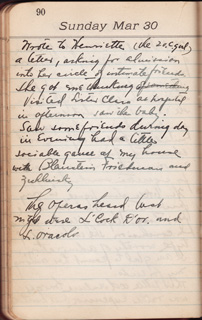
Well I had the sought pleasure
of the 20th Century girl to be with
me at the opera.
She is very nice, although poor
she likes only the high places,
she cannot mix with common
people, and is rather serious
minded, find she is fairly well
educated, fine manners in
conversation, has a passion
for cigarette smoking. peppy.
Her little slim figure is very
fascinating, that beautiful
face, those eyes of enchantment.
In conclusion she is beautiful
type worthy of admiration. —
I am glad to count her among
my friends.
This little adventure tonight
was rather expensive but worthwhile.
———
Matt’s Notes
Papa saw an opera double-feature on his date with the 20th Century Girl. The main attraction was Nicholas Rimsky-Korsakoff’s Le Coq d’Or, which concerns an Eastern European warlord (not unlike those who were making life miserable around the world for people like Papa) who gets his comeuppance for being a jerk. Papa certainly had a rooting interest in the outcome, and since I’m sure he knew the Pushkin poem, “The Golden Cockerel,” on which the opera’s based, he would have really enjoyed himself if he wasn’t too distracted by the “little slim figure” in the next seat.
Then again, if the 20th Century Girl’s education afforded her a working knowledge of opera, Papa would have had cause for worry; the performance apparently wasn’t that good. Though the New York Times had blessed the production, it had saved its highest praise for Rosina Galli-Curci. Alas, she was indisposed on the night of the 29th, thus casting a pall over the proceedings. Irving Kolodin, in his Story of the Metropolitan Opera, describes the consequences thus:
The large repertory was further varied by the return of Le Coq d’or on January 21 with Galli-Curci singing the Queen with excellent style and indifferent pitch, and Laura Robertson as the Voice of the Golden Cock. Giuseppe Bamboschek conducted a cast otherwise very much as before, and the production was Pogany’s…As one was to notice with increasing frequency, the heavy schedule often resulted in cast changes that not merely deprived the audience of a favorite voice, but substituted one of notably inferior quality. Thus, Sabinieeva for Gallie-Curci in Coq d’or…
Oh well. Perhaps the 20th Century Girl’s “passion for cigarette smoking” had her too distracted with thoughts of bodice-ripping ashtrays and tumescent match heads for her to notice the compromised work up on the stage. If not, she at least would have enjoyed the one-act opera that preceded Le Coq: Franco Leoni’s L’Oracolo, a tale of murder and intrigue (a “brilliant little ‘shocker’,” according to the Times) set in San Francisco’s Chinatown. I’m listening to L’Oracolo as I write this, but since I don’t speak Italian and am also sitting on a loud plane with a distressingly chipper flight crew chatting away behind me, much of the dramatic effect is lost.
In any event, there’s plenty of drama building in Papa’s delightfully 19th Century-style account of the 20th Century Girl. The phrases he uses, like “those eyes of enchantment” and “she is worthy of admiration,” sound like the words with which an awkward-but-secretly-loaded Jane Austen hero might stoically torment himself. Papa, of course, was not secretly loaded, and we know the 20th Century Girl “cannot mix with common people.” If Papa were writing a novel instead of his own life’s story, this description of her low tolerance for the low-born would certainly give the experienced reader pause.
———————–
Additional Notes
I still can’t get over how Papa cites the 20th Century Girl’s “passion for cigarettes” as one of her standout qualities. I’ll have to remember to credit myself with a “passion for bourbon” the next time I feel Maker’s Mark-induced shame creeping up on me.
Meanwhile, I’ve tried to figure out how expensive Papa’s night at the opera really was, but I’ve yet to learn what ticket prices were like in his day. Good tickets nowadays run $200 or more — the equivalent of $16 in 1924 dollars — but I doubt he spent that much. I’ll have to keep poking around, but if anyone out there can tell me more, please write to me or drop a comment.
——-
My mother adds:
Papa must have seen Galli Curci other times, because I remember him mentioning her a lot; I guess in an effort to improve my musical taste, which in those days ran toward the top 40. I think Papa probably disapproved of the passion for smoking of the 20th century girl, but was listing her many fine attributes as well as some things not so good, like not mixing with the common people. The fact that he counts her among his friends does not bode well for romance.
————
Sources
- Here’s the Coq d’or review from the New York Times
- And here’s the L’Amico Fritz and L’Oracolo review from the New York Times
- Here’s a good summary of L’Oracolo
